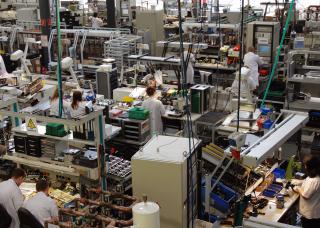Author: Frederick "Ken" Sexe
Systems thinking is critical to understanding how systems perform yet traditional methods of thinking often fail (or worse yet result in unintended consequences) when applied to systems. This is not intended to be a comprehensive article on systems but instead is intended to provide basic systems concepts that will hopefully provide insight for those unable to clearly understand systems. These concepts mainly derive from Russ Ackoff’s presentation to the InThinking Network on February 28, 2005 that is a valuable primer into the understanding of a system. The InThnking Network is a non-profit organization dedicated to systems thinking that has many useful resources for both novices and those expert in systems thinking.
 A system can be defined loosely as two or more components of which one or more are essential parts that interact with each other to achieve a shared goal. This definition has several important factors of which all systems rely upon. The first is that a system contains one or more essential parts of which if removed the system would be unable to achieve its goal. The second is that each part within a system interacts which each other to achieve the goal of the system. It is important to understand that no essential part can by itself perform the function of the system as a whole and that the system cannot perform its function within a larger system if an essential part is removed from the system.
A system can be defined loosely as two or more components of which one or more are essential parts that interact with each other to achieve a shared goal. This definition has several important factors of which all systems rely upon. The first is that a system contains one or more essential parts of which if removed the system would be unable to achieve its goal. The second is that each part within a system interacts which each other to achieve the goal of the system. It is important to understand that no essential part can by itself perform the function of the system as a whole and that the system cannot perform its function within a larger system if an essential part is removed from the system.
Essential parts have three factors that define them. Each essential part can affect the behavior or properties of the whole. Conversely, every subsystem within a larger system can affect the behavior or properties of the whole yet none of the subsystems can have an independent effect on the whole. This factor is important in that if the essential part is altered then the ability of the system to perform its function is impacted, possibly negatively. Therefore, it is possible to improve the performance of an essential part yet degrade the performance of the system.
No essential part has an independent effect on the whole; each essential part instead interacts with other essential parts as a connecting set. An example of this would be the brain within the human body in that the brain is not able to think on its own but instead relies on its interactions with other subsystems within the body to perform. Nor can a subsystem perform the function, behavior, or properties of the larger system. An example of this is the human body in which no component or subsystem within the human body can live yet all of the components and subsystems interact to perform the overall function of the human body (life).
The properties of essential parts provide several concepts important in understanding all systems. The first important concept is that the performance of a system relies on the interactions of the parts within it and not on the performance of the parts taken separately. This concept runs counter to conventional analytical thinking which attempts to gain an understanding of the whole by disassembling the parts. Analytical thinking fails to provide understanding of a system due to the fact that when a system is disassembled it no longer is able to perform it’s role; it is through a study of the interactions that true understanding of a system is gained. The second important concept is that by optimizing the parts one can inadvertently make the system worse. When parts are optimized without consideration of the interactions the ability of the other parts to interact and perform their own role relative to the function of the overall system changes. Russ Ackoff notes that you can take the best parts of all of the cars in the world and place them together and may will not even have a car; this is because each part is designed in relation to interactions with different systems and as such may not work when combined with other parts.
It is my hope that this brief article provides some basic understanding to those who are unfamiliar with how systems work. In future submissions I may focus on other system elements and characteristics; please feel free to contact me if there are any questions you may have. I also hope that others within ASEM more knowledgeable in systems than I am expand upon these so that all members could learn from their expertise.
Graphic Credit: http://www.stockvault.net/photo/116783/electronics-lab
Frederick (Ken) Sexe is a lifelong learner currently wrapping up his PhD in Engineering Management and Organizational Psychology at Northcentral University. His hobbies include challenging prevailing patterns of thinking that discourage new ideas while developing new ways to do things. He is currently employed as a Senior Systems Engineer at Raytheon where he is taking a career break from management to pursue his educational goals and focus on his family.
